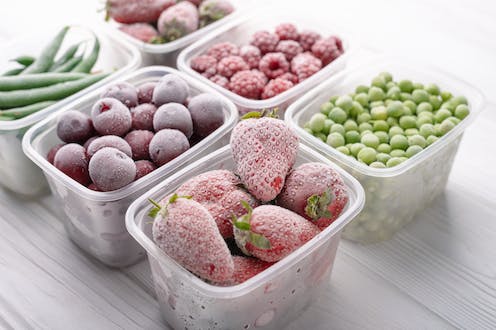
The ongoing cost of living crisis and fruit and vegetable shortages have left many people worrying about how they’re going to get these important foods in their diet. Yet in spite of this, many people may still avoid frozen and tinned produce in the belief that fresh produce from the supermarket is better.
However, not only can frozen and tinned produce be just as nutritious as fresh fruits and vegetables, in some cases they may actually be more nutritious.
Some people shy away from frozen and tinned foods because they’re technically classified as “processed foods”. While these foods may include preservatives, these ingredients are tightly regulated and have no adverse effect on health. Not to mention that the preservation processes used to prevent these foods from spoiling are actually the reason they’re able to maintain so many important nutrients.
Nutrient quality
Fruits and vegetables begin to lose nutrients as soon as they’re picked. They can lose up to half of some nutrients within a couple of days of being harvested.
Vitamins such as vitamin C are especially susceptible to being lost after being picked. Green peas lose about half of their vitamin C within the first two days after harvest. Similar losses are observed in broccoli and beans.
There are many reasons why these nutrients are lost after harvest. First, exposure to light and air can initiate a chemical process called photo-oxidation, which causes nutrients to break down. In addition, natural enzymes present in foods can also break down the nutrients. Microorganisms from soil, air and water can also find their way into foods and feed on the nutrients.
But the methods used to freeze and can foods both prevent spoilage and lower the amount of nutrients lost from the product, as they stop these processes in their tracks.
Canning involves adding heat into foods – typically using temperatures between 120-140℃ to preserve them. Even though foods are only subjected to these temperatures for a few minutes at a time, this inactivates certain enzymes and destroys most microorganisms, preventing the food from spoiling while ensuring many important nutrients aren’t lost.
Freezing, on the other hand, removes heat from the food. By lowering its temperature enough that the water in the food freezes (around -20℃), this slows down the chemical reactions that occur in food – again, preventing important nutrients from being lost. It’s also common practice to blanch foods prior to freezing. This also inactivates the natural enzymes in the foods, preventing further nutrient loss.
Thermal processes (such as canning and blanching) can themselves lead to some inevitable nutrient loss. But the extent of this loss depends on the foods and the nutrients they contain.

Julie Clopper/ Shutterstock
Canning generally leads to a much higher loss of some nutrients than blanching and freezing. This is because it employs higher temperatures and harsher processing conditions, with most fruits and vegetables needing to be boiled in water before being sealed.
Carrots, for example, lose very little vitamin C during freezing. But they can lose a significant proportion of their vitamin C during canning because it’s a water-soluble vitamin – meaning that it’s easily broken down in water, especially after being degraded by heat.
In contrast, vitamin A loss is much lower during canning since it’s more stable against heat. In fact, more vitamin A is lost during the freezing process.
Important nutrients
Though some nutrients can be lost during the blanching, freezing and canning processes, in many cases the foods still retain more important nutrients than they would if picked just before peak ripeness and shipped to their destination supermarket. For example, research shows that the vitamin content of frozen blueberries is comparable – and sometimes even higher – than that of fresh blueberries.
And while tinned peaches may lose some nutrients during the canning process, there’s then virtually no change in their nutrient levels even after three months in storage. The same is true of many other canned and frozen produce, such as peas, sweetcorn and broccoli, which keep many of their nutrients even after a year in storage.
The same applies to other compounds present in foods. For example, polyphenols – natural compounds found in most fruits and vegetables, some of which have been linked to better heart health – can be preserved for longer through freezing.
Ultimately, while there may be some differences in the nutrients available in fresh versus frozen or tinned produce, no one type of food is significantly better than the other. Well, in most cases.
The exceptions include lycopene in tomatoes, the compound that gives tomatoes their red colour, which is actually higher in canned tomatoes than fresh tomatoes. There are several reasons for this – such as the high temperatures used during canning helping release more lycopene. And since it is linked with a lower risk of cardiovascular disease, you may want to consider buying canned tomatoes instead – or canning fresh tomatoes yourself.
Frozen and canned fruits and vegetables are a great way of getting the nutritional benefits of fresh produce without breaking the bank. And in the midst of our current food shortages, they can be a more accessible and longer-lasting option.
![]()
The authors do not work for, consult, own shares in or receive funding from any company or organisation that would benefit from this article, and have disclosed no relevant affiliations beyond their academic appointment.
























